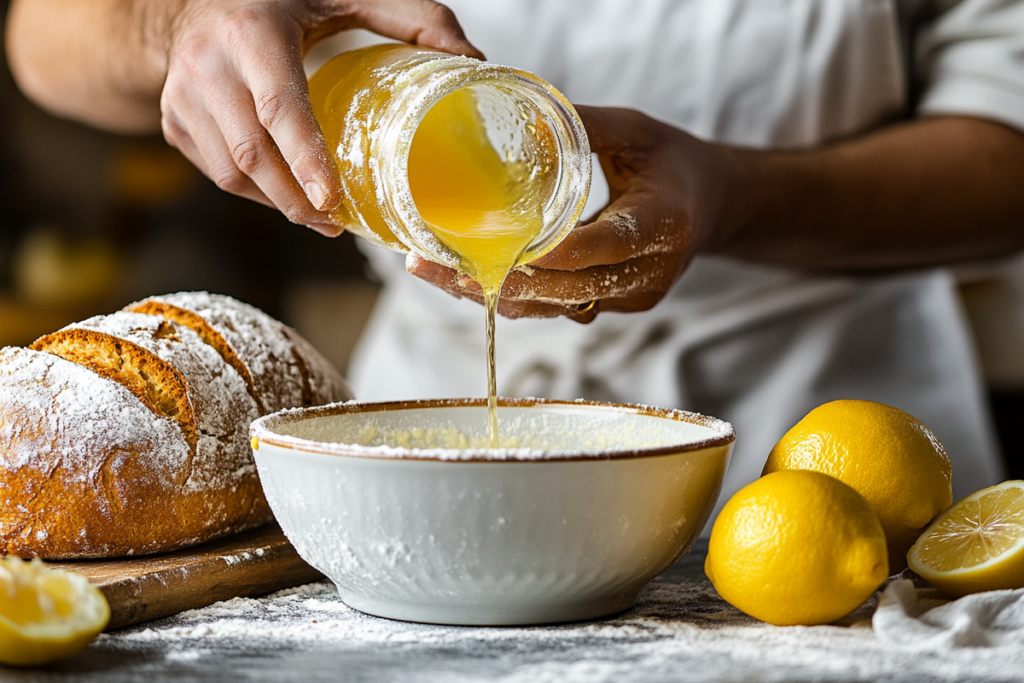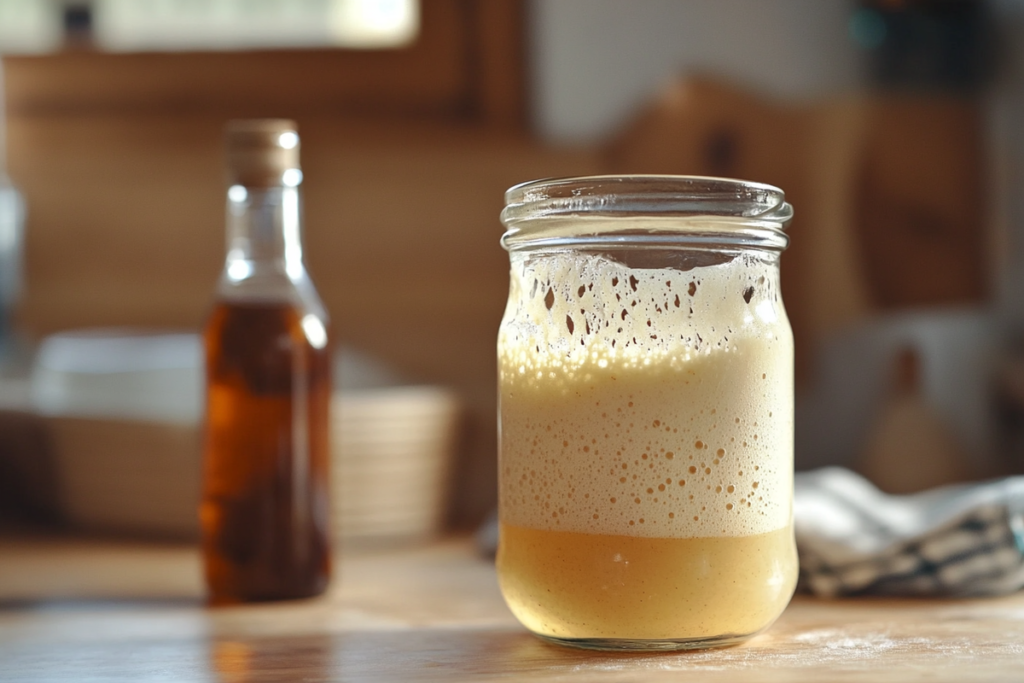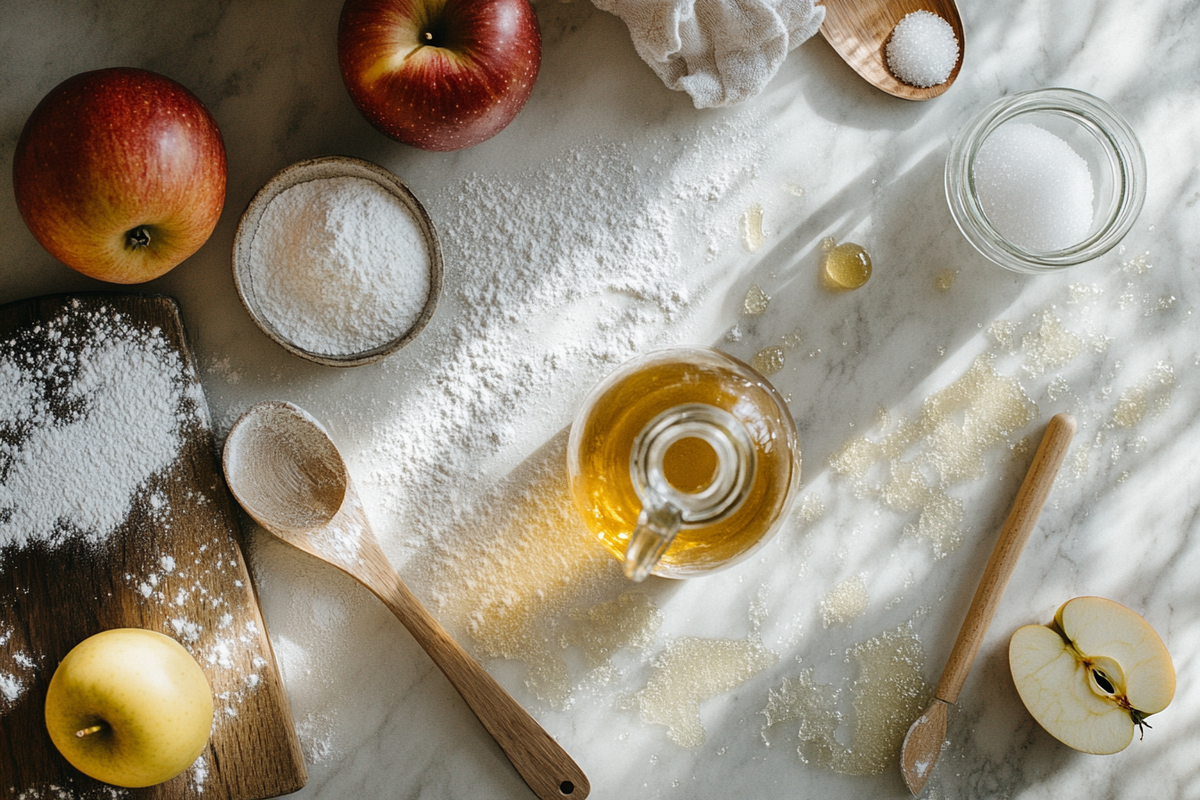Introduction
Baking is like a beautiful dance of flavors, textures, and a touch of science. Every ingredient, including apple cider vinegar, has its moment to shine. This simple pantry staple is known for enhancing leavening, adding a tangy kick, and balancing acidity in recipes—but don’t worry if you’re out of it or prefer something different.
In this article, we’ll walk you through the 10 best substitutes for apple cider vinegar in baking. These options are easy to use and deliver great results without missing a beat. So, let’s explore these clever swaps and make your baking adventures smooth and stress-free!
Table of Contents
The Role of Apple Cider Vinegar in Baking
Apple cider vinegar might seem like a minor addition to a baking recipe, but its role is far from trivial. Its unique properties are a baker’s secret weapon, from fluffier cakes to balanced flavors.
Enhancing Leavening and Rise
One of the most important roles of apple cider vinegar in baking is its interaction with baking soda. When these two combine, they create a chemical reaction that releases carbon dioxide, causing dough or batter to rise. This leavening process ensures light, airy cakes and muffins instead of dense, heavy outcomes.
Contributing to Flavor Profile
Aside from aiding texture, apple cider vinegar brings a slight tanginess that enhances the overall flavor of baked goods. This acidity balances out the sweetness, creating a more nuanced and complex taste. While its impact might be subtle, it’s unmistakable once you experience the difference in recipes that lack it.
Why Substitutes Are Necessary
Not everyone stocks apple cider vinegar, and dietary or taste preferences might suggest an alternative. Thankfully, several substitutes mimic its effects without sacrificing the quality of your baked goods. You can rest assured that your creations will be just as delicious and satisfying.
Top 10 Substitutes for Apple Cider Vinegar in Baking (Part 1)

Choosing the right alternative is crucial when it’s time to substitute apple cider vinegar in your baking recipes. Below, we’ll delve into five popular substitutes, their unique properties, and tips to make the swap seamless. These accessible substitutes can be found in most kitchens, making your baking adventures stress-free and enjoyable.
White Vinegar
White vinegar is one of the easiest and most accessible substitutes for apple cider vinegar. Its strong acidity ensures the leavening reaction with baking soda remains intact, giving your baked goods the lift they need.
Acidity Level Comparison
White vinegar has an acidity level almost identical to apple cider vinegar, typically around 5%. This similarity makes it a reliable choice for maintaining the texture and structure of baked goods.
Flavor Impact on Baked Goods
Unlike apple cider vinegar, white vinegar lacks fruity undertones. While this might slightly alter the flavor, its neutral taste ensures it won’t overpower the other ingredients. White vinegar is a dependable option for recipes where flavor balance is essential.
Lemon Juice

Freshly squeezed lemon juice offers a natural and flavorful alternative to apple cider vinegar. Its tangy profile complements most baked goods, adding brightness to the recipe.
pH Similarity and Leavening Effect
The acidity of lemon juice works like apple cider vinegar when combined with baking soda, producing the carbon dioxide for a fluffy result.
Adjusting Quantity for Desired Taste
Lemon juice has a strong, citrusy flavor. Use it in the same quantity as apple cider vinegar, but if the citrus notes feel too strong, reduce the amount slightly and compensate with water.
Lime Juice
Lime juice, like its citrus cousin, lemon juice, is another excellent substitute. It brings both acidity and a refreshing flavor twist to baked goods.
Acidity and Flavor Considerations
Lime juice’s acidity ensures proper leavening, while its zesty flavor can subtly enhance the overall taste of your recipe. However, its tang is slightly sharper than lemon juice, so consider this when swapping it in.
Best Uses in Baking Recipes
Lime juice is perfect for recipes with tropical or citrus undertones, like key lime pie or lemon bars, where its flavor blends seamlessly.
Rice Vinegar
Rice vinegar, particularly the unseasoned variety, is a milder substitute for apple cider vinegar. Its subtle sweetness and gentle acidity make it a versatile choice for many baked goods.
Sweetness and Acidity Balance
The natural sweetness of rice vinegar adds a delicate touch, which works well in sweeter recipes like cakes or muffins. However, if a sharper acidity is required, consider combining it with a splash of lemon juice.
Suitability for Sweet Baked Goods
Rice vinegar’s mild profile ensures it doesn’t overpower sweet recipes, making it a preferred choice for light and delicate bakes.
Balsamic Vinegar
Balsamic vinegar, with its rich and sweet undertones, is an unconventional but effective substitute for apple cider vinegar.
Sweetness and Acidity Levels
Its lower acidity than apple cider vinegar means you may need to use slightly more to achieve the same leavening effect. However, the added sweetness can bring depth to chocolate cakes or brownies.
Considerations for Use in Baking
Given its distinctive flavor, balsamic vinegar is best reserved for recipes whose sweetness complements the other ingredients.
Top 10 Substitutes for Apple Cider Vinegar in Baking (Part 2)
Continuing the journey through the best substitutes, five more alternatives cater to various taste preferences and recipe needs.
Red Wine Vinegar
With its fruity and slightly tangy flavor, red wine vinegar is an excellent replacement for apple cider vinegar in recipes that need a subtle depth.
Fruity Notes and Acidity
This vinegar’s fruity undertones mirror some of the complexity of apple cider vinegar, though its flavor is less sweet. It works well in recipes with dark or rich flavors, such as spice cakes.
Appropriate Baking Applications
Use red wine vinegar sparingly in recipes where its distinct taste won’t clash with the other ingredients.
Malt Vinegar
Malt vinegar offers a unique, earthy flavor that adds character to baked goods.
Unique Flavor Characteristics
This vinegar has a distinctive taste derived from malted barley. Its mild acidity ensures a balanced leavening reaction while introducing a warm, toasty undertone to the recipe.
Impact on Color and Taste
Malt vinegar can slightly darken the color of your baked goods, so it’s ideal for recipes like gingerbread or spiced cookies.
Apple Juice
If you’re looking for a non-vinegar alternative, apple juice is a fantastic option. It mimics the fruity essence of apple cider vinegar without the sharp acidity.
Mimicking Apple Flavor
Apple juice brings a hint of the same fruity flavor as apple cider vinegar, making it a natural substitute. While it lacks the acidity for leavening, combining it with a small baking powder can help achieve similar results.
Adjusting for Lower Acidity
Since apple juice isn’t as acidic, it’s best used in recipes where the leavening effect, such as sweet bread or cakes, isn’t critical.
Orange Juice
With its natural sweetness and acidity, orange juice can become a citrusy substitute for apple cider vinegar.
Citrus Flavor and Acidity
Orange juice contributes both the acidity required for leavening and a citrus flavor that elevates sweet recipes. It works particularly well in fruit-based desserts.
Best Pairings in Baked Goods
Use orange juice in recipes that pair well with its tangy and slightly sweet profile, such as scones or muffins with fruit fillings.
White Wine Vinegar
White wine vinegar is a gentle substitute that maintains the leavening power and balance needed for baked goods.
Mild Flavor Profile
This vinegar’s mild taste ensures it blends harmoniously with the other ingredients without overpowering them.
Substitution Ratios
Use an equal amount of white wine vinegar instead of apple cider vinegar. Mix it with some apple juice or another sweetener to achieve a closer flavor match.
Practical Tips for Substituting Apple Cider Vinegar
Substituting apple cider vinegar in baking is more than just swapping one ingredient for another. To ensure your baked goods turn out perfectly every time, follow these tips to maintain the right flavor, texture, and acidity balance.
General Guidelines for Substitution
The success of substitution often depends on matching the acidity level and taste profile of apple cider vinegar. Let’s look at some essential guidelines:
Maintaining Proper Acidity Levels
Acidity is crucial for activating leavening agents like baking soda. When choosing a substitute, pick one with comparable acidity, such as white vinegar or lemon juice, to keep your baked goods from turning dense or flat.
Flavor Compatibility with Recipes
While apple cider vinegar has a fruity undertone, not all substitutes share this flavor profile. Consider the overall taste of your recipe. For example, citrus juices work well in sweet recipes, while white vinegar is ideal for neutral flavors.
Adjusting Recipes When Using Substitutes
Baking is as much an art as it is a science. Substituting apple cider vinegar might require minor adjustments to preserve your recipe’s integrity.
Balancing Liquid Ratios
If you’re using a liquid substitute like lemon juice or orange juice, you might need to reduce the amount of other liquids in the recipe slightly. It ensures the batter doesn’t become too runny, and the final texture stays consistent.
Compensating for Flavor Differences
Consider reducing the amount slightly or diluting it with water using stronger-flavored substitutes like balsamic or red wine vinegar. This can prevent the substitute from overpowering the intended flavor of the baked goods.
Frequently Asked Questions (FAQs)
When it comes to apple cider vinegar substitutes in baking, questions abound. Below, we answer some of the most common queries to help you bake with confidence.
Can I use apple cider vinegar instead of white vinegar?
Yes, apple cider vinegar can replace white vinegar in most recipes. However, its fruity flavor may slightly alter the taste of your baked goods. White vinegar might be better if the recipe relies on a neutral flavor.
Are all vinegars gluten-free?
Most vinegar, including apple cider, white, and rice vinegar, are naturally gluten-free. However, malt vinegar is not gluten-free because it’s derived from barley containing gluten. Always check product labels to ensure they meet your dietary needs.
Which apple cider vinegar is best for baking?
For baking, it’s best to use filtered apple cider vinegar. It has a clearer appearance and milder taste than unfiltered varieties, which may add an unnecessary earthy note to delicate recipes.
Can I skip apple cider vinegar in a recipe?
Skipping apple cider vinegar is possible, but it may affect the recipe’s texture and flavor. To maintain quality, choose a suitable substitute like white vinegar or lemon juice to replicate its effects.
Can you substitute apple cider vinegar in baking?
Absolutely! Several options, such as lemon juice, white vinegar, or rice vinegar, can replace apple cider vinegar in baking while maintaining the desired acidity and leavening properties.
What is the best apple cider vinegar substitute for baking?
The best substitute depends on your recipe. White vinegar and lemon juice are versatile and reliable, while orange juice or apple juice works well in sweeter recipes.
Conclusion

Baking is like a harmonious dance of flavors, textures, and just the right amount of science. Every ingredient, including apple cider vinegar, has a key role. This humble pantry staple is prized for enhancing leavening, adding a tangy twist, and balancing acidity in recipes. With its mild acidity, Apple cider vinegar reacts with baking soda to produce carbon dioxide, which helps baked goods rise. But don’t worry if you’re out or prefer an alternative.
Interestingly, with their unique tangy acidity, sourdough starters can be a versatile substitute for apple cider vinegar in certain recipes. In this article, we’ll explore the 10 best substitutes for apple cider vinegar in baking, including tips for incorporating your sourdough starter into the mix. Let’s dive in and keep your baking adventures, whether sourdough-inspired or not, stress-free and delicious!

